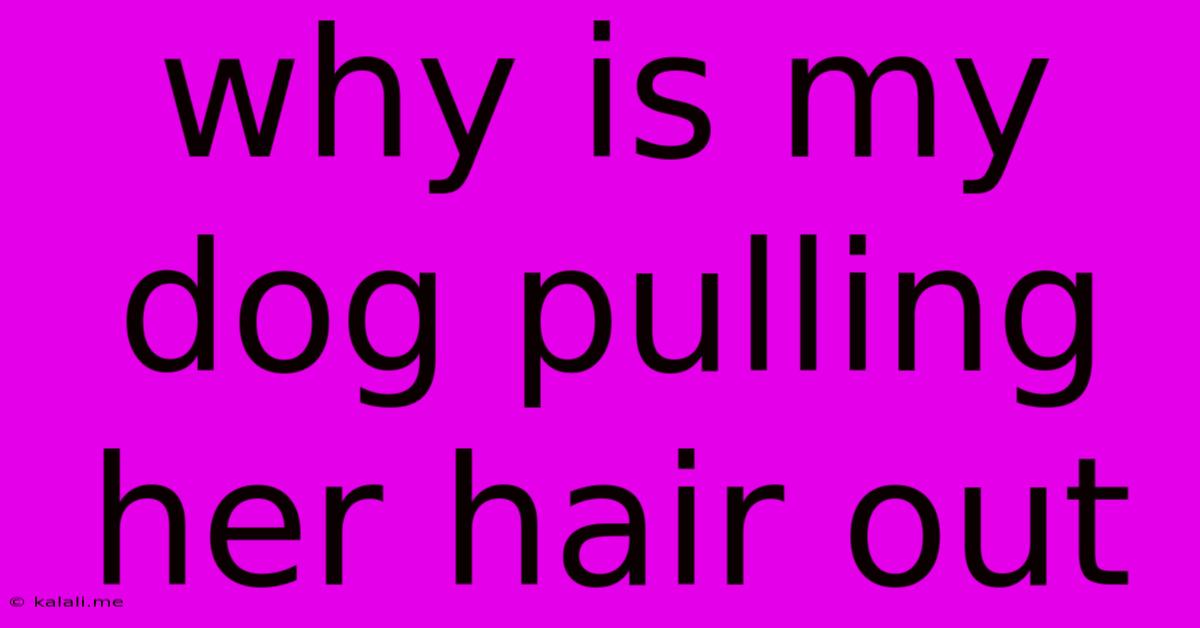Why Is My Dog Pulling Her Hair Out
Kalali
May 25, 2025 · 3 min read

Table of Contents
Why Is My Dog Pulling Her Hair Out? A Comprehensive Guide to Canine Alopecia
Is your dog constantly scratching, licking, or chewing at their fur, resulting in patches of hair loss? This distressing behavior, known as alopecia, can have several underlying causes, ranging from simple skin irritations to more serious medical conditions. Understanding the potential reasons behind your dog's hair pulling is crucial for providing them with the necessary care and treatment. This article will explore the common causes of alopecia in dogs, helping you determine the next steps to take.
Possible Reasons for Your Dog's Hair Pulling:
Several factors can contribute to a dog pulling out their own hair. It's important to note that this isn't always a behavioral issue; often, it's a symptom of an underlying medical problem requiring veterinary attention.
1. Parasites:
- Fleas and Ticks: These tiny pests are common culprits, causing intense itching and irritation that leads to scratching and hair loss. Regular flea and tick preventative treatments are essential. Look for small black specks (flea dirt) in your dog's fur, especially around the belly and tail.
- Mites: Mites, such as Demodex and Sarcoptes, can burrow into the skin, causing inflammation, itching, and hair loss. These infestations often require veterinary treatment with specialized medications.
- Lice: Though less common than fleas and mites, lice can also cause significant itching and hair loss.
2. Allergies:
- Environmental Allergies: Pollen, dust mites, and other airborne allergens can trigger allergic reactions in dogs, leading to itchy skin and hair loss. Symptoms often worsen during specific seasons.
- Food Allergies: Certain ingredients in dog food can cause allergic reactions, manifested as skin problems, including itching and hair loss. Identifying and eliminating the allergen through a diet trial is often necessary.
- Contact Allergies: Exposure to certain substances, such as shampoos, detergents, or plants, can lead to contact dermatitis and hair loss.
3. Skin Infections:
- Bacterial Infections: Bacterial infections can cause inflammation, redness, and hair loss. These infections often require antibiotic treatment.
- Fungal Infections: Ringworm, a fungal infection, is highly contagious and can cause circular patches of hair loss. Veterinary diagnosis and treatment are necessary.
- Yeast Infections: Yeast overgrowth can lead to itchy, inflamed skin and hair loss, often appearing in moist areas like the ears and paws.
4. Hormonal Imbalances:
Hormonal disorders, such as hypothyroidism and Cushing's disease, can disrupt the normal skin cycle, leading to hair loss and other skin problems. Veterinary testing is required for diagnosis.
5. Autoimmune Diseases:
Autoimmune diseases, where the body's immune system attacks its own tissues, can cause hair loss and other skin problems. These conditions often require specialized veterinary care.
6. Behavioral Issues:
While less frequent than medical causes, excessive licking, chewing, or scratching can also result in alopecia. Underlying anxiety, stress, or compulsive disorders might be at play. Addressing the root cause of the behavioral issue is critical in these cases.
7. Nutritional Deficiencies:
Insufficient intake of essential nutrients can affect skin and coat health, potentially leading to hair loss. A balanced diet is crucial for maintaining healthy skin and fur.
When to See a Vet:
If your dog is experiencing significant hair loss, persistent itching, or any other concerning skin symptoms, it's crucial to consult a veterinarian. They can perform a thorough examination, run diagnostic tests (such as skin scrapings and blood work), and provide an accurate diagnosis and appropriate treatment plan. Early intervention is key to managing many of these conditions effectively. Don't delay seeking professional help for your furry friend. Remember, self-treating can sometimes worsen the problem.
Conclusion:
Alopecia in dogs can stem from various underlying issues, ranging from simple irritations to complex medical conditions. By understanding the potential causes and recognizing the symptoms, you can take the appropriate steps to ensure your dog receives the necessary care and returns to a healthy, happy state. Always consult your veterinarian for a proper diagnosis and treatment plan.
Latest Posts
Latest Posts
-
Hole Size For 3 8 Bolt
May 25, 2025
-
How To Fill The Wall Holes
May 25, 2025
-
Difference Between Metal Drill Bit And Wood Drill Bit
May 25, 2025
-
Bathroom Gfci 15 Or 20 Amp
May 25, 2025
-
Origin Of Bane Of My Existence
May 25, 2025
Related Post
Thank you for visiting our website which covers about Why Is My Dog Pulling Her Hair Out . We hope the information provided has been useful to you. Feel free to contact us if you have any questions or need further assistance. See you next time and don't miss to bookmark.